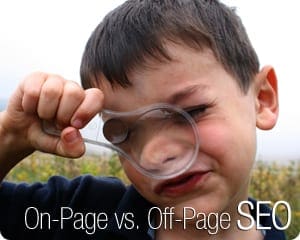On-Site Vs. Offsite SEO: The Latest Recommendations

If you take charge of optimizing your site, you would also know that Google’s algorithm changes constantly. You always need to be on the top of things to know where to focus your energy to be able to get the best returns. One thing you need to understand is the difference between on-site and offsite SEO and the best ways you can make both work for you.
When you take steps on your actual web page to lay the path for a good search plan, which is on-site SEO. Things like your site’s titles, URL structure, meta tags, and XML sitemap. As you go along, it also takes into account each page’s URLs, title tags, alt tags for images and the keywords you have sued. On the other hand, off site SEO is all about the things you do to create a network of links that point back to your site. Search engines look to these links for signals of authority. Some of the examples of off site SEO is link building, article marketing, linkbait pieces that are shared on websites such as Reddit, social media campaigns and inbound marketing.
What are some of the things you can change or do to improve your site’s performance in the next 4 weeks? You must remember that your content is the most important factor in SEO. High quality content becomes link worthy and share worthy, and this can go a long way. Similarly, poor quality content will not be linked and shared easily, resulting in poor site performance.
Top 2 On-site SEO Action Points
Ensure that your SEO plugin is good. Consider adding [pwal id=”47569893″ description=””]
on an SEO plug-in like Yoast if you are using WordPress. This will help you in evaluating your SEO situation and give you great tips that you can use instantly and see a leap of improvement in your site. Yoast also has great features like analysis tools which will give you tips on your content before it is published. If you follow the advice given out, this itself can help your rankings.
Review your pages’ title tags. Title tags tell a search engine what an article or online content is about. After the content of your site, title tags are the most important thing to a website. Always include your keywords and descriptions in your title tags but take care as to not over stuff the title tag with them. An example to consider is [Primary Keyword] – [Site Name] – [Secondary Keyword]. So for example, if your site is about education, the title of an article might be “How To Get a Good Education – The Happy Educator – How to Get the Best Education.” Your URLs should be descriptive enough too; one that includes your keyword.
Top 2 Offsite SEO Action Points
Find out and identify a list of top blogs and influencers in your niche. This is your jackpot. Once you find them, spend some time daily to read up these blogs and start interacting in the comments section. If your discussions are interesting and hold some value, the writer of the blogs will recognize you. You may get the opportunity to guest post and your comment can become a link to promote your own products or services. Establish these relationships well, because in social networking, networking should be done well.
Guest posting: If you are able to guest post on other blogs, this is one of the best ways to get great links to your own site. Look for ways of being able to guest post and approach the bloggers. Once again, when putting up a guest post, ensure that the quality of the post is of the best quality. Ensure that you are connecting with people through this post. Once you have created great articles, you will get great returns. Share this post on social media and reach your target audience.
Managing SEO this year is not as easy as it used to be. Know well what you should do and see long term results. Use the successful strategy: high quality content, develop a foundation of your site with on-site SEO and build great links by reaching out. Your site will start to do extremely well.
This post is by 99MediaLab, a Virginia SEO Company
[/pwal]




